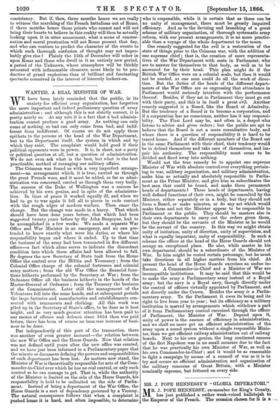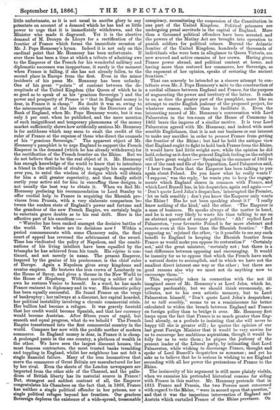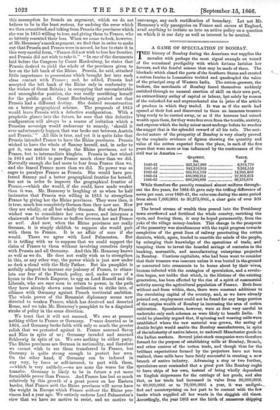MR. J. POPE HEliNESSY'S "GLORIA IMPERATORI."
AIR. J. POPE HENNESSY, ex-member for King's County, .111. has just published a rather weak-voiced hallelujah to the Emperor of the French. The occasion chosen for it is a little unfortunate, as it is not usual to ascribe glory to any potentate on account of a demand which he has had so little power to urge that it is immediately withdrawn, and the Minister who made it disgraced. Yet it is the abortive demand of M. Drouyn de Lhuys for a rectification of the frontier of France which forms the immediate occasion of Mr. J. Pope Hennessy's hymn. Indeed it is not only on this cardinal point that Mr. Hennessy has been unfortunate. If ever there has been a time at which a tribute of admiring awe to the Emperor of the French for his wonderful military and diplomatic successes was inopportune, it surely is the moment when France is falling, if she has not already fallen, to the second place in Europe from the first. Even in the minor incidents of his pa3an Mr. Hennessy has been unlucky. One of his great " points " of contrast between the de- crepitude of the United Kingdom (the Queen of which he is so good as to speak of as his gracious Sovereign ') and the power and prosperity of France is "that in England money is dear, in France it is cheap." No doubt it was so, owing to the misconception of the late crisis by the Directors of the Bank of England, when Mr. Pope Hennessy wrote, but it was only 5 per cent. when he published, and the mere mention of such insignificant and temporary phenomena of the money market sufficiently shows how artificially anxious Mr. Hennessy is for antitheses which may seem to exalt the credit of the ruler of France at the expense of those who direct the counsels of his "gracious Sovereign." The apparent object of Mr. Hennessy's pamphlet is to urge England to support the French Emperor in the demand (which he has already withdrawn) for the rectification of the French frontier on the Rhine. But we do not believe that to be the real object of it. Mr. Hennessy has enough knowledge of the world to know that to introduce a friend in the attitude of rivalry, to magnify his superiority over you, to extol the wisdom of designs which will obtain for him a still greater superiority, and then finally solicit curtly your active aid for him in executing these designs, is not usually the best way to obtain it. When we find Mr. Hennessy prefacing his recommendation to Lord Stanley to offer cordial help to France in acquiring the Rhenish pro- vinces from Prussia, with a very elaborate comparison be- tween the sunken state of England's power and fortune and the grandeur of the new French Empire, we certainly begin to entertain grave doubts as to his real drift. Here is the effective part of his exordium :—
"Waterloo has been ranked amongst the decisive battles of
the world. Yet where are its decisions now Within a period commensurate with some Chancery suits, the final court of appeal has reversed the arbitrament of the sword. Time has vindicated the policy of Napoleon, and the combi- nations of his living intellect have been equalled by the triumphs he has achieved from his tomb. His re'gime is con- tinued, and not merely in name. The present Emperor, inspired by the genius of his predecessor, is the chief ruler of Europe. Again a Napoleon gives away kingdoms and creates empires. He bestows the iron crown of Lombardy on the House of Savoy, and gives a throne in the New World to the House of Hapsburg. Without moving a soldier of his own he restores Venice to herself. In a word, he has made France eminent in diplomacy and in war. His domestic policy has been equally successful. He found France on the verge of bankruptcy ; her railways at a discount, her capital hoarded, her political instability involving a chronic commercial crisis. Her bullion had become a refugee. It was gravely foretold that her credit would become Spanish, and that her currency would become Austrian. After fifteen years of rapid, but smooth and equal progress, what do we behold? The French Empire transformed into the first commercial country in the world. Compare her now with the prolific mother of modern commerce. In England money is dear, in France it is cheap. A prolonged panic in the one country, a plethora of wealth in the other. We have seen the largest discount houses, the most famous contractors, the most trusted banks trembling and toppling in England, whilst her neighbour has not felt a single financial failure. Many of the iron locomotives that move the commerce of Great Britain are manufactured for her by her rival. Even the sheets of the London newspapers are imported from the other side of the Channel, and the palla- dium of British liberty has its material source in France But, strangest and saddest contrast of all, the Emperor tongratulates his Chambers on the fact that, in 1866, France has neither a single political offender in her prisons, nor a single political refugee beyond her frontiers. Our gracious Sovereign deplores the existence of a wide-spread, treasonable conspiracy, necessitating the suspension of the Constitution in one part of the United Kingdom. Political prisoners are undergoing penal servitude in the capital of England. More than a thousand political offenders have been arrested, and the powers of the Mutiny Act are brought into operation to punish soldiers for political crimes. Beyond the Atlantic frontier of the United Kingdom, hundreds of thousands of individuals who were born in allegiance to Queen Victoria, are now avowed and active enemies of her crown. Having given France power abroad, and political content at home, and having more than restored her commerce, her Sovereign, as, the exponent of her opinion, speaks of restoring the ancient frontiers."
That can scarcely be intended as a sincere attempt to con- tribute even Mr. J. Pope Hennessy's mite to the construction of a cordial alliance between England and France, for the purpose of augmenting the power and territory of the latter. It reads to us, as does the greater part of the pamphlet, more like an attempt to excite English jealousy of the proposed project, for whatever reason, rather than to facilitate it. Even the interesting record of Mr. Hennessy's conversation with Lord Palmerston in the tea-room of the House of Commons in 1863 bears the impress of a similar motive. It is true Lord Palmerston agreed with Mr. Hennessy, and indeed with most sensible Englishmen, that it is not our business or our interest to make any sacrifice in order to prevent France from getting the frontier of the Rhine ; but had he held the antique view that England ought to fight to hold back France from the Rhine, it would have had little weight now, while the opinion he did hold, echoing as it does the general English feeling on the subject will have great weight :—" Speaking in the summer of 1863 to one of the rank and file of the Opposition, Lord Palmerston said, I hear from Paris that the Emperor has been talking to you again about Poland. Do you know what he really wants
suppose,' was the reply, he wants you to keep the engage- ments which England shares in common with France, and whichLord Russell has, in his despatches, again and again Don't quote Lord John's despatches,' interrupted the Premier, 'let us talk sensibly ; don't you know the Emperor only wants the Rhine ? Has he not been speaking about it /"I really know nothing of the kind,' said the other. The Emperor is a man of business. He speaks always of the matter in hand, and he is not very likely to waste his time talking to me on an abstract question of remote politics.' 'Ah I' replied Lord Palmerston, 'your favourite Poland is far more abstract and remote even at this hour than the Rhenish frontier.' 'But supposing so,' rejoined the other, is it possible to see any such benefit to England in keeping the Rhenish frontier from France as would make you oppose its restoration?' Certainly not,' said the great minister, certainly not ; but there is a vast difference between opposing and encouraging. It would be insanity for us to oppose that which the French have such a natural desire to accomplish, and in which we have not the smallest direct interest one way or the other ; but there are good reasons also why we must not do anything now to encourage them.' "
This, especially taken in connection with the not ill imagined sneer of Mr. Hennessy's at Lord John, which he, perhaps pardonably, but we should think erroneously, at- tributes, not to his own artistic memory, but to Lord Palmerston himself, "Don't quote Lord John's despatches ; let us talk sensibly," seems to us a reminiscence far better calculated to widen the breach between England and France on foreign policy than to bridge it over. Mr. Hennessy first harps upon the fact that France is so much greater than Eng- land already, as a prelude to insisting that she will never be happy till she is greater still ; he quotes the opinion of our last great Foreign Minister that it would be very unwise for us to encourage her ambitious aspirations, though it would be folly for us to veto them ; he piques the jealousy of the present leader of the Liberal party, by intimating that Lord Palmerston, while wishing to discourage France, thought and spoke of Lord Russell's despatches as nonsense ; and yet he asks us to believe that he is serious in wishing to see England seconding with all her power the pretensions of France to the Rhine.
The insincerity of his argument is still more plainly visible, when we examine his pretended historical reasons for siding with France in this matter. Mr. Hennessy pretends that in 1815 France and Prussia, the two Powers most concerned with regard to the Rhine, "were in accord upon that question," and that it was the imperious intervention of England and Austria which curtailed France of the Rhine provinces. On
this assumption he founds an argument, which we do not believe to be in the least serious, for undoing the error which we then committed, and taking from Prussia the provinces which
• she was in 1815 willing to lose, and giving them to France, who so bitterly resented their loss. When we come to look, however, at Mr. Hennessy's mock argument, we find that in order to make out that Prussia and France were in accord, he has to state it in this very careful form, "France did not wish to lose her frontier, and Prussia did not wish to take it." "In one of the documents laid -before the Congress by Count Hardenberg, he states that Prussia desired to yield the -whole of the provinces given to her on the left bank of the Rhine. Prussia, he said, attached little importance to possessions which brought her into such close contact with France ; and, he added, Prussia had accepted the left bank of the Rhine only in conformity to the wishes of Great Britain ; in occupying that uncomfortable and unsought-for position, she was really sacrificing herself for the public good. Count Hardenberg pointed out that Prussia had a different destiny. She desired reconstruction on a better geographical scheme. The proposals of 1815 would leave Prussia with a defective configuration. With a prophetic glance into the future, he sees that this defective configuration will always be a source of irritation which a Prussian sovereign would endeavour to remedy, should it ever unfortunately happen that war broke out between Austria and Prussia.'" All this is true, and yet it is quite false that Prussia intended France to have the Rhine provinces. Prussia wished to have the whole of Saxony herself, and, in order to get it, was anxious to resign the Rhine provinces, not to France, but to intermediate kinglets. Prussia in fact wished in 1814 and 1815 to pare France much closer than we did. Naturally enough she had more to fear from France than we, and she feared France more than we did. No power was so eager to paralyze France as Prussia. She would have pre- ferred Saxony and a better geographical frontier for herself, but not in order Co improve the geographical frontier of France,—which she would, if she could, have made weaker than it was. Mr. Hennessy is laughing at us when he half insinuates that Prussia was willing in 1815 to strengthen France by giving her the Rhine provinces. They were then, it is true, much less completely German than they now are. Now they are wholly, or all but wholly German. But what Prussia wished was to consolidate her own power, and interpose a chainwork of border States as buffers between her and France as well. And now, when the Rhine provinces are really German, it is simply childish to suppose she would part with them to - Fiance. It is no affair of ours if she would. There we agree with Lord Palmerston. But it is trifling with us to suppose that we could support the claim of France to them without involving ourselves deeply with Prussia and all Germany. And this Mr. Hennessy knows as well as we do. He does not really wish us to strengthen in this, or any other way, the power which is just now under so dark a cloud with the Holy Father. But his pamphlet is artfully adapted to increase our jealousy of France, to stimu- late our fear of the French policy, and, under cover of a hymn to the French Emperor, to egg on Lord Russell and the Liberals, who are sure soon to return to power, in the path they have already shown some inclination to strike into, of alliance with Germany against French territorial ambition. The whole power of the Romanist diplomacy seems now directed to weaken France, which has deceived and deserted Rome, and we take Mr. Hennessy's pamphlet to be a disguised stroke of policy in the same direction.
We trust that it will not succeed. We owe at present nothing either to France or Germany. Dance deserted us in 1864, and Germany broke faith with only so much the greater relish that we protested against it. France annexed Savoy and Nice in spite of us ; Germany invaded and annexed Schleswig in spite of us. We owe nothing to either party. The Rhine provinces are German in nationality, and therefore we cannot wish to see them transferred to France, but Germany is quite strong enough to protect her own. On the other hand, if Germany can be' induced in any way, by force or self-interest, to part with them, —which is very unlikely,—we are none the worse for the transfer. Germany is likely to be in future a yet more formidable power than France. And France has lost so much relatively by this growth of a great power on her Eastern border, that France with the Rhine provinces will never have the weight in Europe which France without the Rhine pro- vinces had a year ago. We entirely endorse Lord Palmerston's _view that we have no motive to resist, and no motive to
encourage, any such rectification of boundary. Let not Mr. Hennessy's wily panegyrics on France and sneers at England, avail anything to irritate us into an active. policy on a question on which it is our duty as well as interest to be neutral.
































 Previous page
Previous page